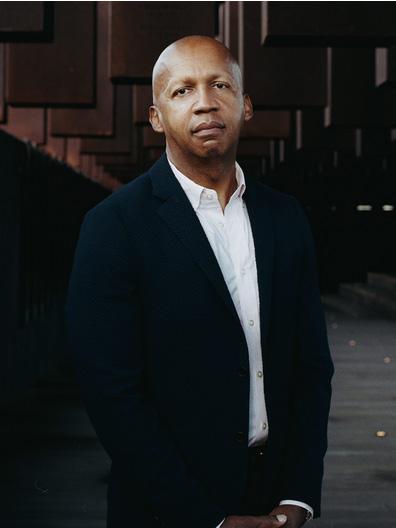
3 minute read
DEMOCRACY 2020 AUTHORS
BRYAN STEVENSON
Author of the award winning, New York Times bestseller, Just Mercy, which was recently adapted into a major motion picture.
Against the backdrop of today's social and political climate, Bryan Stevenson, the founding director of the Equal Justice Institute (EJI) in Montgomery, Alabama, shares his insights and lessons learned over 30 years on the front lines fighting injustice and inequality in the United States criminal justice system. Under Mr. Stevenson's leadership, EJI has won significant legal challenges eliminating excessive and unfair sentencing, exonerating innocent death row prisoners, confronting abuse of the incarcerated and the mentally ill, and aiding children prosecuted as adults. Mr. Stevenson has argued and won multiple cases at the United States Supreme Court, including a 2019 ruling protecting condemned prisoners with dementia and a landmark 2012 ruling that banned mandatory life-imprisonment-without-parole sentences for children 17 years of age and younger. Mr. Stevenson and his staff have won reversals, relief, or release from prison for over 135 wrongly condemned prisoners on death row and won relief for hundreds of others wrongly convicted or unfairly sentenced. Mr. Stevenson has initiated new anti-poverty and antidiscrimination efforts that challenge inequality in America. He led the creation of two highly acclaimed cultural sites, which opened in 2018: the Legacy Museum and the National Memorial for Peace and Justice. These new national landmark institutions chronicle the legacy of slavery, lynching, racial segregation, and the connection to mass incarceration and contemporary racial bias issues. Mr. Stevenson is also a Professor of Law at the New York University School of Law. Space is limited. Registration is required. Visit cpl.org/stevenson Sat, Dec 5 | 2pm | virtual event: Zoom

CATHY O'NEIL
Important decisions that affect our lives are made every day. Increasingly, those decisions are made not by humans but by computers. In theory, this should lead to more fairness since everyone is judged by the same rules and bias is eliminated. In reality, the algorithms that are used to make these decisions are opaque, unregulated, and uncontestable…even when they’re wrong. These algorithms regularly reinforce discrimination or are built on historical data that punishes the downtrodden based on information as innocuous as their zip code. Tracing the arc of a person’s life, O’Neil exposes the black box models that shape our future as individuals and as a society. These “weapons of math destruction” score students and teachers, sort resumes, grant (or deny) loans, evaluate workers, target voters, set parole, and monitor our health. O’Neil calls on modelers to take more responsibility for their algorithms and on policy makers to regulate their use. But in the end, it’s up to us to become more savvy about the models that govern our lives. This important book empowers us to ask the tough questions, uncover the truth, and demand change. O’Neill is a regular contributor to Bloomberg View, an American mathematician, and the author of the blog mathbabe.org and several books on data science, including Weapons of Math Destruction. The book highlights how the decisions that affect our day-to-day lives are being made by mathematical models. She is the former Director of the Lede Program in Data Practices at Columbia University's Graduate School of Journalism's Tow Center and was employed as a Data Science Consultant at Johnson Research Labs. Space is limited. Registration is required. Visit cpl.org/oneil Sat, Sep 26 | 2pm | virtual event: Zoom

Presented as a part of #CLEReads Young Adult Book Festival DR. IBRAM X. KENDI
Racist Ideas in America: From Slavery to Black Lives Matter
Friday, December 4 | 2pm | viritual event: TBA Dr. Ibram X. Kendi is one of America’s foremost historians and leading antiracist voices. He is a National Book Award-winner and his book Stamped: Racism, Antiracism, and You is a #1 New York Times bestseller. Kendi is the Andrew W. Mellon Professor in the Humanities and the Founding Director of the Boston University Center for Antiracist Research.





